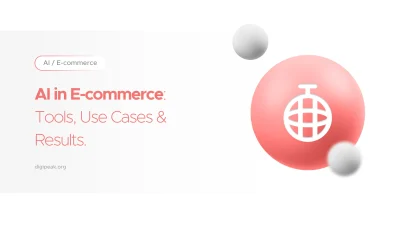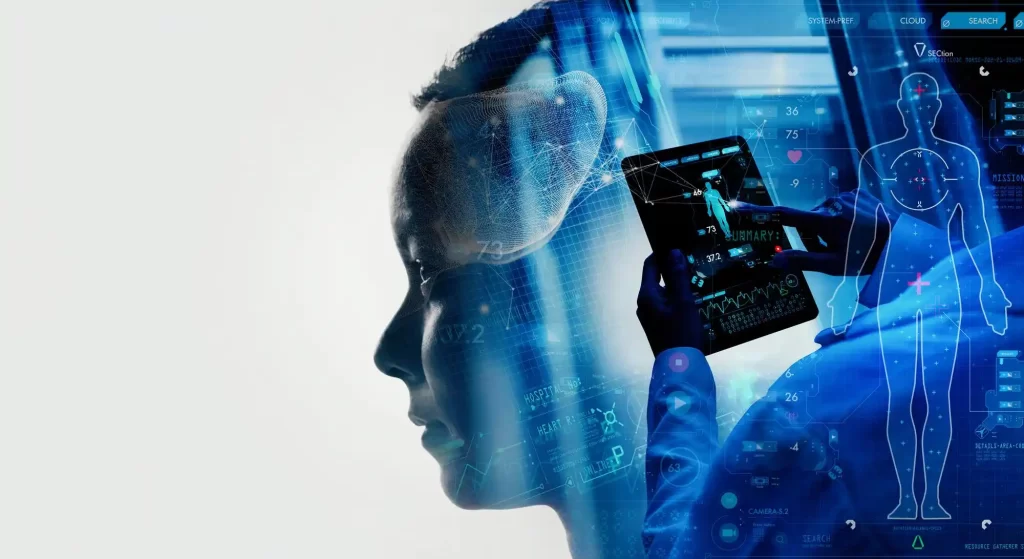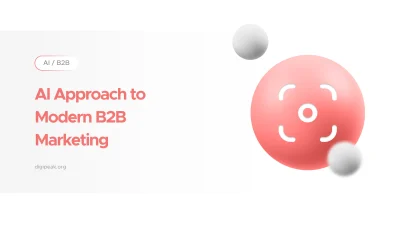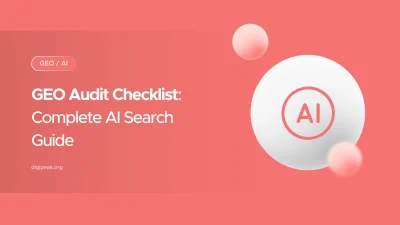
AI in E-commerce: Tools, Use Cases & Results.
Do you recall when "Artificial Intelligence" in e-commerce was little more than a basic chatbot? …
06/07/2023 -
8 dk okuma
Stay up to date with Peakers
Artificial Intelligence is revolutionizing the health sector. Innovative artificial intelligence applications, now used in many areas from diagnosis to treatment and prevention, are making a huge impact in the fight against diseases. These exciting developments are improving the quality of medical services and making patients’ lives easier. In this blog post, we will explore the impact of AI in healthcare in the areas of diagnosis, treatment and prevention.
Artificial Intelligence is making a big impact in the field of diagnosis. Thanks to deep learning algorithms, early diagnosis of diseases is done faster and more accurately. AI-supported image analysis is achieving great success in fields such as radiology and pathology. For example, algorithms developed for the early diagnosis of lung cancer can analyze scan results to identify risky areas and provide important guidance to doctors.
[cta-ekle slogan-metni=”Capture Transformation with Artificial Intelligence in Health! For Detailed Information and Services:” buton-metni=”Reach Us”]
Radiology and pathology are medical disciplines that play a critical role in the diagnosis and treatment of diseases. In these fields, accurate and fast image analysis is vital. While traditional methods can be time-consuming and inaccurate, AI-assisted image analysis is revolutionizing this process.
Artificial intelligence algorithms enable more accurate diagnoses, treatment plans, and early diagnosis of diseases in radiology and pathology. Therefore, AI-assisted image analysis represents the beginning of a new era in radiology and pathology.
Lung cancer is one of the most common cancers worldwide and a disease where early detection is vital. Artificial intelligence has great potential in the early detection of lung cancer. Using advanced algorithms and deep learning techniques, AI systems can detect potential tumors by analyzing lung images. This enables doctors to diagnose cancerous lesions faster and more accurately.
AI-assisted early detection enables patients to start treatment at earlier stages, increasing treatment success and saving lives. The role of AI in lung cancer offers new hope for improving patients’ quality of life and fighting cancer.
Artificial Intelligence also plays a major role in treatment processes. By analyzing data such as patients’ genetic profiles and medical histories, personalized treatment methods can be developed. In addition, artificial intelligence systems that provide warnings about drug interactions and side effects of patients help healthcare professionals make more accurate treatment decisions. AI-supported immunotherapy, which is used especially in cancer treatment, increases treatment success by offering a personalized approach.
[cta-ekle slogan-metni=”Are You Ready for the Artificial Intelligence Revolution in Healthcare? Discover Our Innovation and Digital Marketing Strategies!” buton-metni=”Reach Us”]
Genetic analysis and personalized treatment play an important role in the future of medicine. Artificial intelligence technology plays a major role in this field. Genetic analysis is used to determine disease risks and personalize treatment strategies by examining the genetic makeup of individuals.

By analyzing genetic data, AI algorithms can assess patients’ genetic predispositions and provide an early diagnosis of diseases. Based on this information, personalized treatment plans can be created, and patients can respond better to treatment. Genetic analysis and AI-powered personalized treatment are important tools to improve patients’ health outcomes and optimize treatment processes.
Take Advantage of Automation with Artificial Intelligence!
How can you use your time more efficiently? Artificial intelligence saves you time by automating repetitive tasks. Learn how you can leverage AI to accelerate your business processes.
AI-powered immunotherapy has revolutionized cancer treatment in recent years. Immunotherapy aims to target cancer cells by strengthening the immune system. However, immunotherapy treatment does not have the same effect on every patient, and responses may vary. This is where artificial intelligence comes in.
By analyzing large datasets, AI algorithms are used to predict patients’ immune system responses and their response to treatment. In this way, doctors and researchers can determine treatment plans for patients who will respond best to immunotherapy.
AI-assisted immunotherapy is revolutionizing cancer treatment. Patients respond better to treatment, and side effects are minimized. In addition, treatment processes can be managed more effectively, and more predictable results can be achieved.
AI-assisted immunotherapy has become a new source of hope by changing the paradigms of cancer treatment. Thanks to this technology, the quality of life of cancer patients is improved, and treatment success is further increased. The role of artificial intelligence in cancer treatment will become even more important in the future and will provide strong support in the health struggles of patients.
Artificial intelligence also plays an important role in disease prevention. By analyzing health data, people at risk of disease can be identified, and preventive measures can be taken. For example, an AI system that assesses the risk of diabetes can help prevent the development of the disease by providing recommendations on the person’s eating habits and lifestyle. AI-supported health monitoring systems can prevent the progression of diseases by monitoring the health status of individuals and providing early warnings.
Diabetes is a common health problem worldwide. However, early detection of diabetes and taking preventive measures are of great importance in controlling the disease. Artificial intelligence technology has been an effective tool in assessing diabetes risk and determining preventive measures.
Artificial intelligence algorithms are used to predict individuals’ risk of diabetes by analyzing large data sets. These analyses take into account genetic factors, lifestyle factors, dietary habits, and other risk factors to create an individualized risk profile. In this way, healthcare professionals can identify individuals’ diabetes risk at an early stage and take appropriate preventive measures.

AI-supported diabetes risk assessment encourages individuals to act more consciously. Preventive measures such as healthy lifestyle changes, regular exercise, a balanced diet, and weight control help prevent and manage diabetes. AI technology provides guidance on identifying and following these preventive measures.
Artificial intelligence technology in diabetes risk assessment and preventive measures is revolutionizing healthcare. It helps individuals monitor their health status and detect diabetes early, while enabling healthcare professionals to provide a more effective intervention. AI-enabled methods for controlling diabetes and promoting healthy living will become even more widespread in the future and will play an important role in the fight against diabetes.
Health monitoring systems are an innovative technology used to continuously monitor the health status of individuals and prevent health problems with early warning systems. These systems work with the integration of artificial intelligence and sensors to continuously monitor the vital signs, activities, and health data of individuals.
Early warning systems are one of the most important features of health monitoring systems. AI algorithms analyze health data to detect abnormal conditions and send early warnings to users. For example, a sudden rise in blood pressure, an irregular heart rate, or signs of a diabetic crisis can be detected with early warning. In this way, individuals can intervene quickly and prevent serious health problems.

Health monitoring systems also help individuals achieve their healthy life goals. It encourages individuals to achieve their healthy lifestyle goals with features such as activity tracking, sleep pattern monitoring, and nutrition tracking. AI-supported health tracking systems encourage healthy behavior changes by providing personalized recommendations and motivation to users.
Early warning and prevention with health tracking systems enable individuals to better manage their health status. Early diagnosis and intervention prevent serious health problems, while providing support for achieving healthy lifestyle goals. Health tracking systems integrated with artificial intelligence technology will play an important role in healthcare services in the future and will enable individuals to be more health-conscious and empowered.
Artificial intelligence technology in healthcare has great potential in the areas of diagnosis, treatment, and prevention. Thanks to these innovative applications, early diagnosis of diseases is facilitated, treatment processes are customized, and effective measures are taken to prevent diseases. Artificial intelligence increases the efficiency and quality of healthcare services and improves the quality of life of patients.
It’s time to join the artificial intelligence revolution in healthcare! To further grow your business and optimize your digital marketing strategies, you can get help from Digipeak, a digital marketing agency. As Digipeak, we offer customized solutions with our expert staff and enable you to highlight your business on digital platforms. Shape the future with artificial intelligence in health and grow your business with Digipeak! Take action now and take a step on the road to success!
[cta-ekle slogan-metni=”As a Digital Marketing Agency, We Make a Difference in the Health Sector! Click Now and Learn the Details!” buton-metni=”Hello :)”]
Get an Offer


Join Us So You Don't
Miss Out on Digital Marketing News!
Join the Digipeak Newsletter.
Related Posts

Do you recall when "Artificial Intelligence" in e-commerce was little more than a basic chatbot? …

The year is 2026. The digital marketing playbook from just a couple of years ago …

Before we explore the new frameworks, let's face the reality of our current environment. The …

The digital landscape is undergoing a profound structural shift driven by Large Language Models (LLMs) …